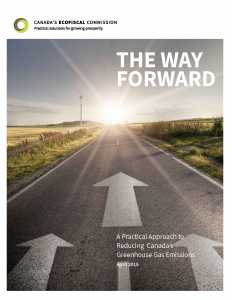
The Way Forward and the Doug Purvis Prize
Ecofiscal’s first report on climate policy, The Way Forward, was just awarded the Doug Purvis prize by the Canadian Economics Association. Quite apart from being a strong vote of confidence in the quality of the research and policy prescriptions contained in the report, the prize was also personally meaningful for the twelve Ecofiscal commissioners. Here’s why.
 Doug Purvis was a great economist and a great Canadian. His academic career was spent at Queen’s University where he taught and supervised scores of young Canadian economists who then went on to teach or practise economics around the world. Doug was uncommonly generous with his time and his insights, and those who knew him were quickly counted as friends.
Doug Purvis was a great economist and a great Canadian. His academic career was spent at Queen’s University where he taught and supervised scores of young Canadian economists who then went on to teach or practise economics around the world. Doug was uncommonly generous with his time and his insights, and those who knew him were quickly counted as friends.
But what really made Doug unique was his ability to glide so effectively between the halls of academe, the corridors of political power, and the boardrooms of the corporate world. He could speak to finance ministers about the problems of large budget deficits with as much clarity and conviction as he could speak to his colleagues and students about the limitations of a particular modelling technique.
With Doug’s tragic death in 1993, at the age of only 45, Canada lost a great policy-thinking economist. And many of us on the Commission lost a friend, a teacher, a colleague, and a mentor.
![]() The Doug Purvis prize, awarded annually at the Canadian Economics Associations annual meetings in June, was created to celebrate Doug’s enormous contributions –but also to send a clear signal to the profession of the importance of engaging in research and debate about sound economic policy.
The Doug Purvis prize, awarded annually at the Canadian Economics Associations annual meetings in June, was created to celebrate Doug’s enormous contributions –but also to send a clear signal to the profession of the importance of engaging in research and debate about sound economic policy.
Climate change was not a headline issue in the early 1990s, but if Doug were with us today I am sure that he would embrace the activities of the Ecofiscal Commission. The idea of harnessing the power of markets to drive innovation, and to recognize that market prices sometimes need to be corrected through  well-designed policy, was at the heart of Doug’s rigorous Chicago training. So carbon pricing would have been an obvious policy approach for him, as the benefits of more general pollution pricing were emphasized in his introductory textbook, co-written with Dick Lipsey.
well-designed policy, was at the heart of Doug’s rigorous Chicago training. So carbon pricing would have been an obvious policy approach for him, as the benefits of more general pollution pricing were emphasized in his introductory textbook, co-written with Dick Lipsey.
Doug also would have seen the importance of thinking carefully about how the textbook logic of carbon pricing could best be applied in the Canadian context – with overlapping provincial and federal jurisdictions, provinces which vary in their emissions profiles and energy mixes, and a system of fiscal federalism that is mindful of the potential pitfalls associated with transferring fiscal capacity across borders. He would have viewed all of this as a policy challenge well worth solving.
Unfortunately, we will never know whether Doug Purvis would have endorsed the specific recommendations contained in The Way Forward. But he would have cherished the opportunity to debate the issue with his students, colleagues, and today’s political leaders. We miss him still.
Read the Report: The Way Forward Read the Interactive Summary



Comments are closed.